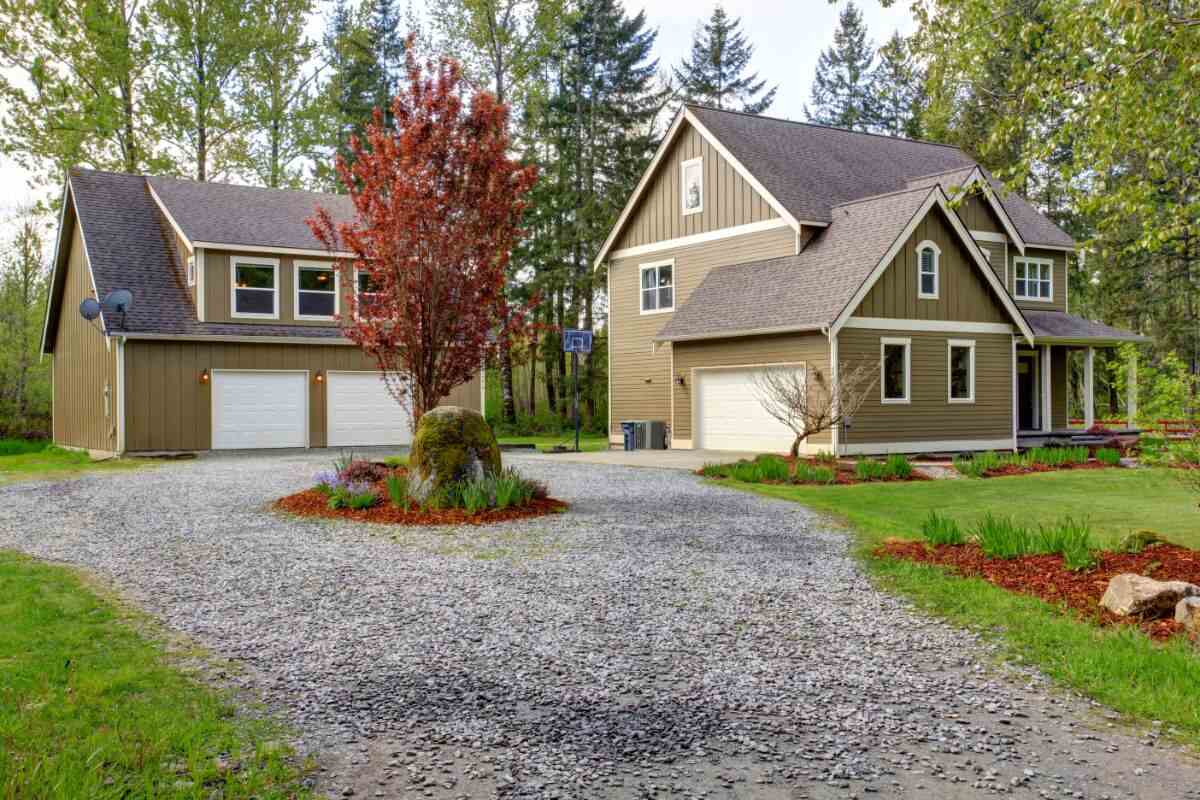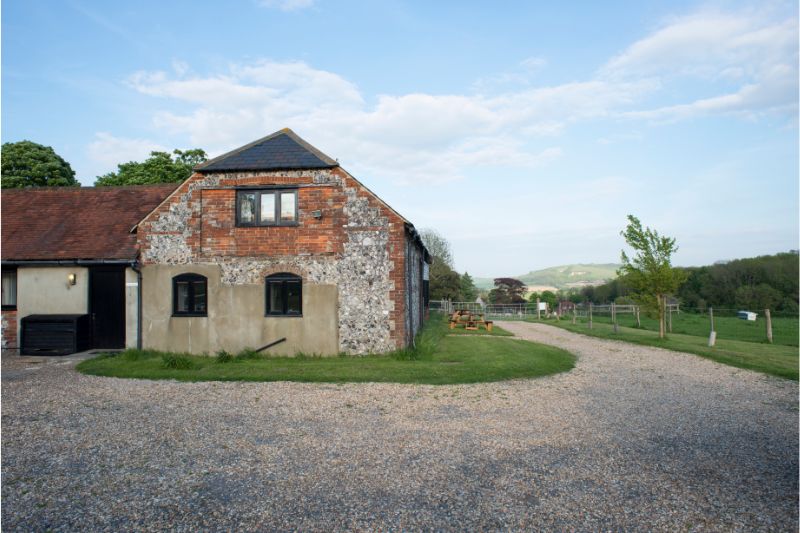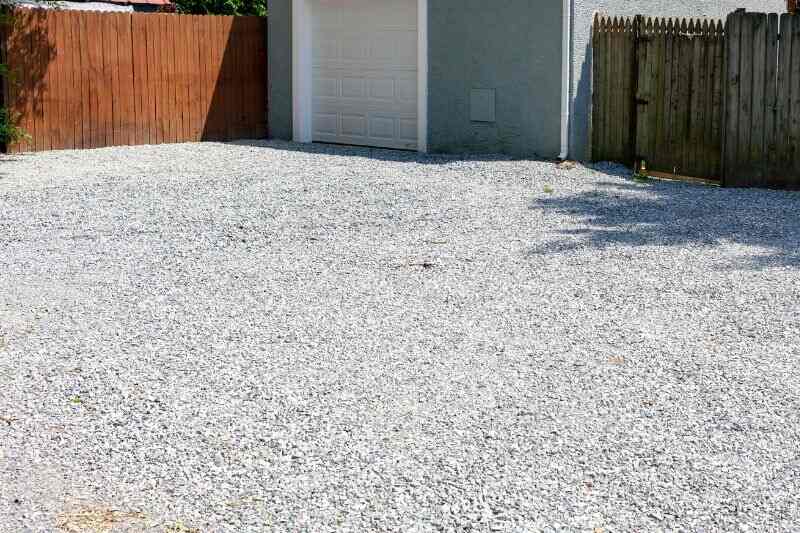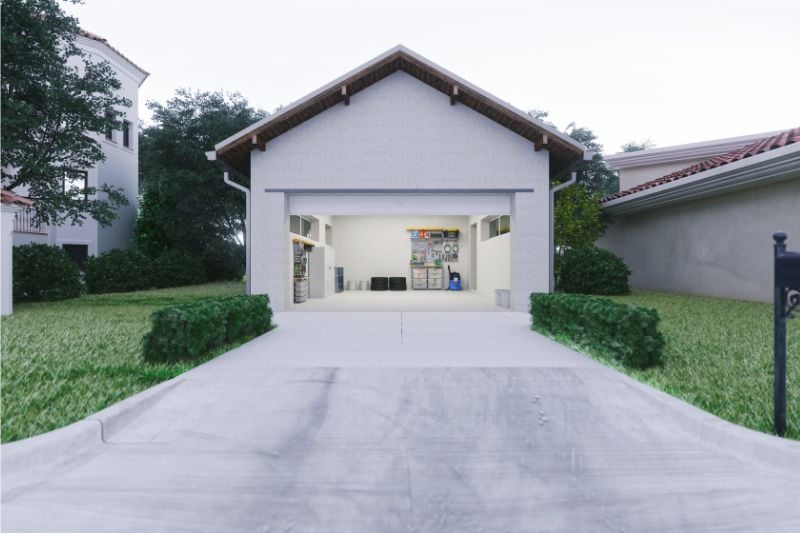
Gravel driveways are a cost effective and environmentally friendly alternative to asphalt driveways. A well-built gravel driveway can replace unsightly muddy ruts and damaged grass, improving curb appeal and increasing your property value. This step-by-step guide will explain everything you need to know to build a gravel driveway.
Planning

Now that you’ve decided you’d like to put in a gravel driveway, there are a few steps you should take in preparation for your new driveway build.
Pick the Location
The first step in building your gravel driveway is to identify the proper location. Here are some things to consider:
- Waterflow: It is important to select a location that is not part of the property’s watershed because water flowing across your driveway can cause significant erosion.
- Call Before You Dig: In addition to evaluating water flow, you should determine what utility lines might be crossing your property. Call 811 to schedule utility companies to come out and mark utility lines.
Outline the Path
The next step is to outline the path of your new driveway with stakes, paint, or flags. Determining your driveway area is a key step in helping you determine the amount of gravel you will need for the project.
Calculate the Gravel Needed
After you have staked out your driveway, calculate the length, width, and depth of the driveway. The depth of your driveway should be between 6 and 12 inches. Multiply the depth by the length and width to get the cubic feet. Divide this number by 27 to get cubic yards. Then provide the measurement to your provider in cubic yards so they can calculate the tonnage you will need.
Select Your Gravel
Next, determine the type of gravel you will need to complete your project. Typically driveways consist of a larger base layer intermixed with finer grains of gravel. The driveway surface is a smaller top layer with color that reflects the home owner’s desired aesthetic.
Schedule Delivery
The last step of the planning is to schedule delivery of the aggregate materials needed to complete your project. Identify the location on your property where the gravel will be deposited for spreading. This should be close to where you intend to place your gravel drive. Call your gravel provider and schedule delivery.
Rent Skid Steer
Contact an equipment rental company and schedule delivery of a skid steer. A skid steer is a kind of compact heavy equipment also known as a bobcat. Make sure it is scheduled for after your gravel is delivered. Be sure the skid steer has a front end loader attachment. You may also want to include a box grader attachment if available. This will aid in leveling the road.
Site Preparation
With all the pre-construction steps complete, you can begin prepping the site for the gravel driveway.
Remove the Topsoil
Using your rented skid steer or shovels, begin removing topsoil along the path of your gravel driveway. You should aim for 6 to 12 inches in depth.
You may want to use this soil to level areas of your property or fill in unwanted depressions. If this step requires a backhoe or a bulldozer, you may want to consider contracting out these tasks.
Level the Ground
After removing the topsoil, utilize the box grader attachment or rakes and shovels to level out the soil along your driveway. An uneven surface will cause your driveway to deteriorate at a faster rate. At this point you may also want to use rakes and shovels to clean up the edges of your driveway path.
Apply Weed Barrier
As a final site preparation step, add a layer of permeable landscaping fabric or geotextile material as a weed barrier. This will prevent grasses, weeds, and larger plants from growing up in the middle of your new driveway.
Gravel

After all the site preparation steps have been completed, you can now begin putting down your first layer of gravel.
Add Base Layer
For smaller projects utilize a shovel and wheelbarrow to begin laying a base layer of rocks on top of your landscaping fabric. For larger projects, use the front end loader on your skid steer to place it along the path of your driveway. This base layer should be made up of larger 2 to 3 inch gravel.
Level And Compact Ground
Use your box grader or shovel and rake to level out the base layer as much as possible. It is recommended that you utilize a compactor or heavy vehicle to compress each layer of crushed rock applied to your driveway.
Add Top Layer
After your base layer is level, add the top layer of stone. This stone should be ½ inch to 2 inches and of a color that reflects your desired aesthetic. When leveling or grading the top layer of stone, it is common to have a high center or crown to prevent gravel loss and pothole formation. It is recommended that a 4 percent grade be used when crowning your drive.
Gravel Driveway Cost
If you are interested in making your own gravel driveway, it is important to investigate the price and options available to you. If you decided to hire a professional to do it, know that the national average cost of installing a gravel driveway is $1,500, but you can pay as much as $60,000 or as little as $300 depending on the choices you make.
Other Options

Photo Credit: imaginima / Canva Pro / License
Selecting a Driveway
Maybe a gravel driveway isn’t the best driveway for you? It is important to review the different types of driveways and determine which is ideal for your situation.
Concrete Driveways
The most common type of driveway is a concrete driveway. If you find a concrete driveway is the right choice for you, on average the price of a concrete driveway is $6 to $16 per square foot, or between $1,885 to $6,475 total.
FAQ
There are a number of materials you can utilize as a weed prevention layer when building your driveway. A quality landscape fabric is most highly recommended. This permeable layer allows for the natural drainage of rain water into the soil.
For gravel driveways, maintaining the proper grade and repairing potholes are one of several important maintenance steps. Though low maintenance, there are important steps to maintaining your driveway to ensure it is a long lasting addition to your property.
Larger sized gravel is used as the base layer on a driveway and the top layer is usually smaller, somewhere between 1 and 2 inches.
Final Thoughts
Despite the environmental, cost, and curb appeal benefits a gravel driveway can provide, installing a DIY drive yourself may be an overwhelming prospect. If you’d like to take advantage of the increased property values a driveway could provide but find the project overwhelming, consider consulting a landscape expert to complete the project.
Main Image Credit: irina88w / Canva Pro / License